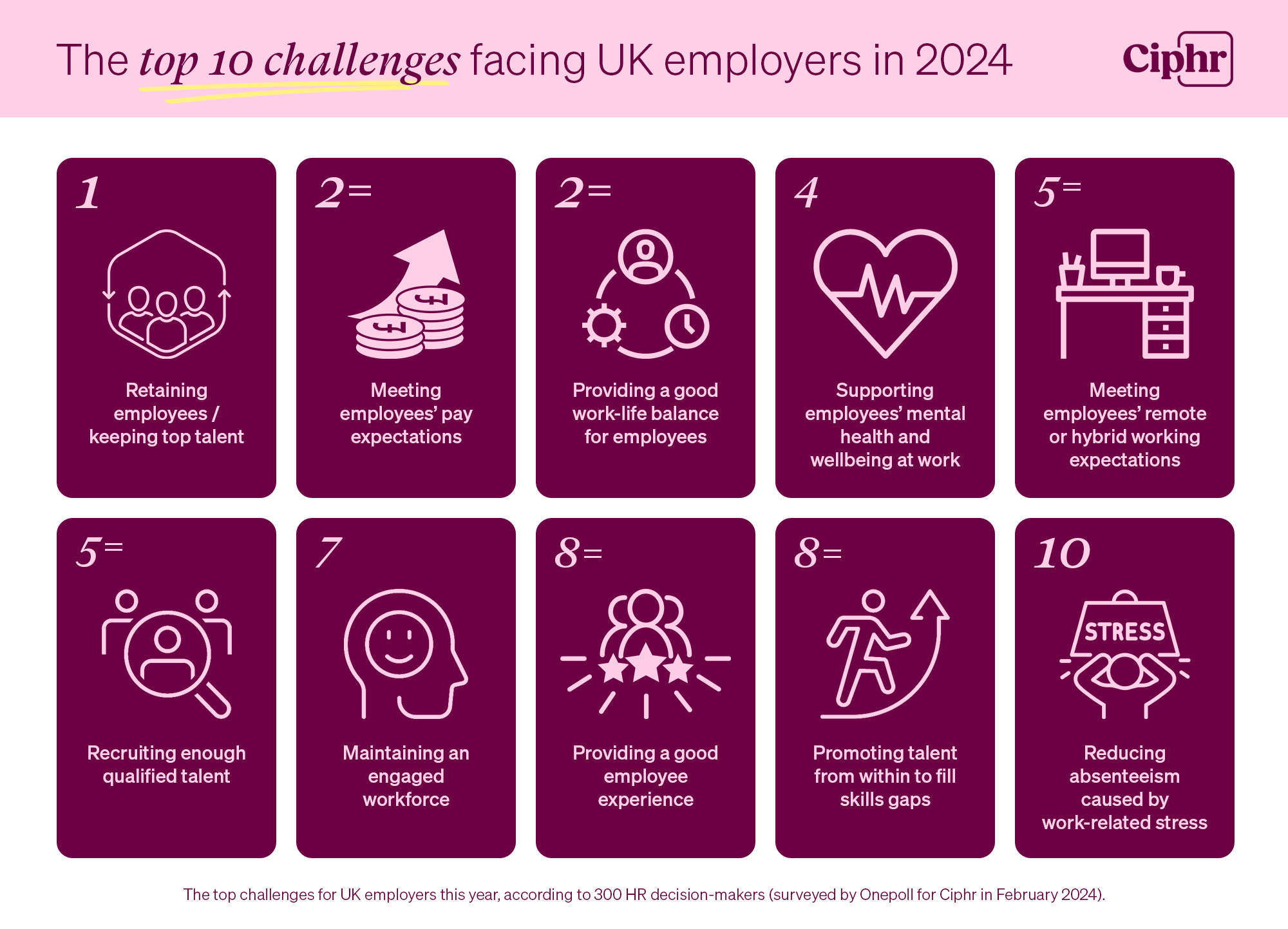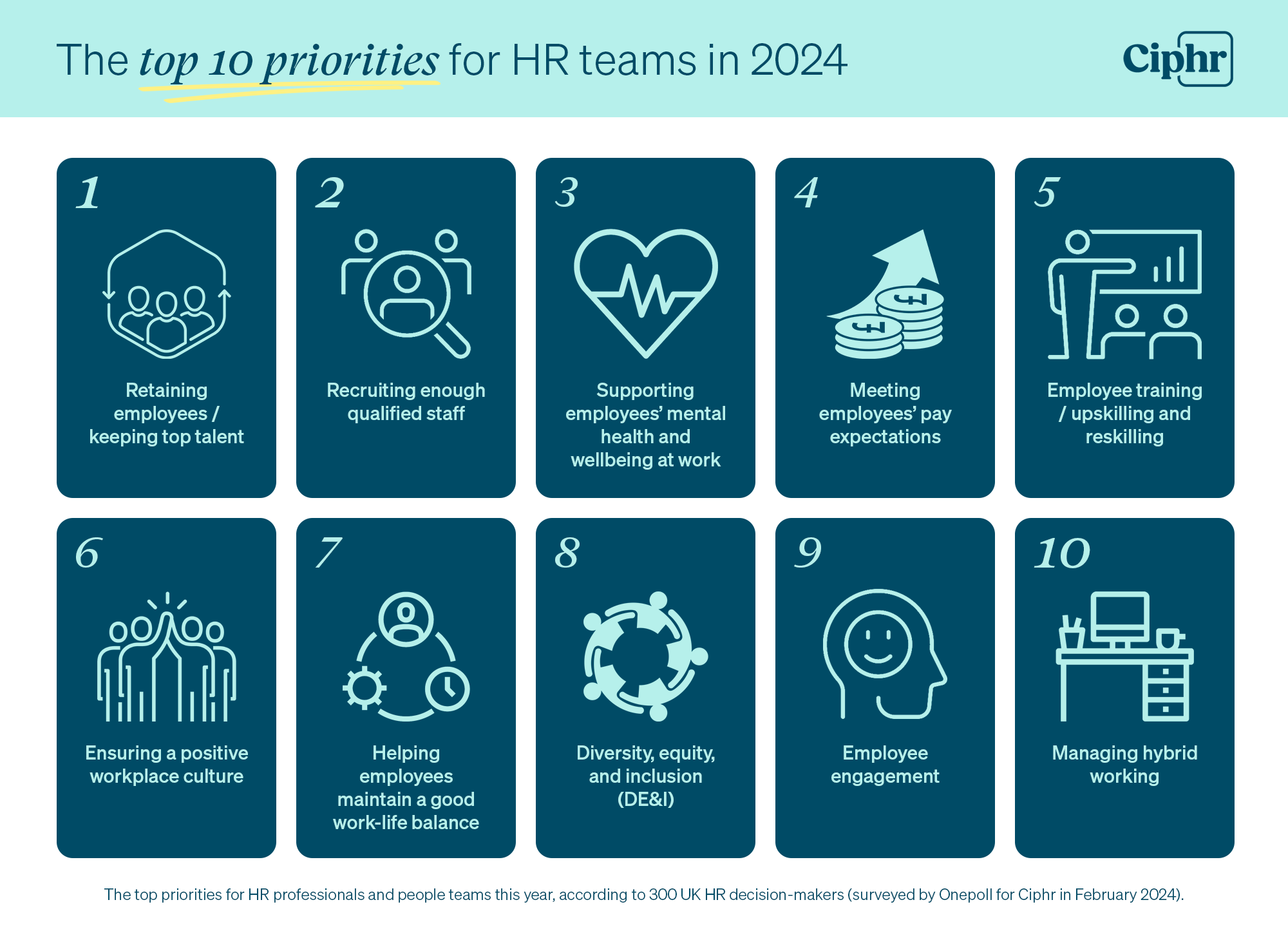Employee retention remains a key HR challenge and top priority for UK employers this year, according to a new survey of 300 HR decision-makers.
HR software provider Ciphr commissioned a survey of 300 UK-based HR decision-makers to find out which workplace challenges, if any, were causing their organisations the biggest concerns.
Ciphr’s research revealed that over half (51%) of HR professionals think that talent retention is (or will be) the biggest challenge facing their organisation in 2024.
Meeting employees’ pay expectations (especially after a few years of record inflation), providing staff with a good work-life balance, and supporting mental health and wellbeing at work were also cited as key challenges by nearly half (46%) of those polled.
Many (45%) employers are also contending with issues around satisfying their staff’s remote or hybrid working expectations, recruiting enough qualified candidates for open positions, and the challenge of maintaining an engaged workforce.
Survey respondents were also asked to share their views on the top priorities for HR teams for the year ahead. Keeping / retaining skilled staff was seen as the most important priority for many organisations in 2024. Recruitment, supporting health and wellbeing at work, and meeting salary expectations also ranked highly among the list of priorities.

Biggest challenges facing UK organisations in 2024
Ciphr's survey posed a series of questions about which factors, if any, HR professionals thought are, or will be, the biggest challenges for their organisations in 2024.
Respondents were asked to multi-select any/all options (challenges) from the randomised lists that applied to their organisation, in their opinion (‘none of the above’ answers were also provided).
On average, each respondent selected 11 different workplace challenges – which suggests that the majority of UK employers are grappling with numerous workplace challenges right now.
The research found that the most common challenges facing UK employers in 2024 are:
- Retaining employees / keeping top talent (cited by 51% of surveyed HR professionals)
- Meeting employees’ pay expectations (46%)
- Providing a good work-life balance for employees (46%)
- Supporting employees’ mental health and wellbeing at work (46%)
- Meeting employees’ remote or hybrid working expectations (45%)
- Recruiting enough qualified talent (45%)
- Maintaining an engaged workforce (45%)
- Providing a good employee experience (42%)
- Promoting talent from within to fill skills gaps (42%)
- Reducing absenteeism caused by work-related stress (41%)
- Ensuring a positive workplace culture (41%)
↓↓ Scroll down for the full results ↓↓
Ciphr's survey of 300 HR decision-makers has revealed the biggest workplace challenges for UK organisations this year:
Biggest workforce challenges – by organisation size
Over half (51%) of HR professionals taking part in Ciphr’s survey said that employee retention is their organisation’s biggest challenge to overcome in 2024. That figure rose to 57% for larger employers (those with 250 employees or more) and decreased to 36% for smaller employers (those with between 1 and 49 employees).
HR decision-makers at large enterprises are also more likely to be concerned about the business challenges (and potential obstacles) of providing a good work-life balance for their employees (55% vs 36% of respondents at small organisations), managing rising pay expectations (54% vs 41%), supporting their workforces’ mental health and wellbeing (53% vs 38%), and meeting people’s remote or hybrid working expectations (51% vs 34%).
Notably, employers with the biggest workforces are almost twice as likely to report ‘ensuring a positive workplace culture’ as a significant challenge when compared to those with the smallest workforces (47% compared to 25%).
Whereas the top three concerns for smaller employers, with less than 50 staff, are the challenges of providing regular and ongoing employee training and development opportunities (45%), recruiting enough qualified talent (43%) and encouraging their employees to attend the physical workplace (a specific number of times a week).
For HR professionals at medium-sized organisations, with 50-249 employees, the biggest workplace challenges impacting them (after retention, which was cited by 52% of survey respondents in this group) are providing a good employee experience (46%) and internal promotion opportunities to fill skills gaps (46%).
The chart below highlights how employers in different sized businesses are being impacted by the most common challenges facing all UK employers.
Click on any column to sort the results in ascending or descending order:
Common challenges facing employers in different industries
Based on Ciphr’s survey findings, some of the types of challenges that organisations face varies depending on the industry they operate in. While most employers do share many common workplace challenges – such as retaining talent, meeting pay expectations, ensuring a good work-life balance, providing health and wellbeing support, and recruiting enough staff – some challenges affect some sectors more than others.
The biggest workplace challenge for employers in teaching and education, for example, is not retaining their staff but rather promoting talent from within to fill skills gaps. Over three-quarters (77%) of HR professionals employed in this sector report filling skills gaps as their chief concern, over the challenges of retention (69%) and providing a better work-life balance for their employees (69%).
Managing budget shortfalls, prioritising diversity and inclusion (EDI) initiatives and policies, and meeting employees’ career progression expectations were named among the top five challenges for HR teams working in healthcare (retention and work-life balance concerns were named their biggest challenges, by 63% of respondents).
Over half of HR professionals working in retail (another big UK employment sector) listed providing a good employee experience (58%), supporting employees’ mental health and wellbeing at work (54%), and ensuring a positive workplace culture (54%) among their top three workplace challenges (pay and recruitment came next).
Staff retention, managing salary expectations, improving work-life balance, providing wellbeing support, and talent shortages are all big challenges for HR teams across the UK. But which industries are being affected most by these specific challenges right now?
- Over two-fifths of HR survey respondents working in the teaching and education sector (69%), hospitality (68%), and transport and logistics (67%) think that retaining employees is their organisation’s biggest challenge for 2024
- Meeting employees' pay expectations is the biggest challenge for employers in engineering and manufacturing, hospitality, and IT (according to 67%, 63% and 55% of HR professionals in those respective industries)
- A significant 78% of HR professionals in the transport and logistics sector think that providing a good work-life balance for employees is their biggest challenge for the year ahead. It’s also a key challenge for employers in teaching and education (69%) and accountancy, banking and finance (61%). Industries that all have a reputation for long working hours
- Supporting employees’ mental health and wellbeing is seen as the biggest challenge for HR professionals working in public services and administration (75%), healthcare (63%), and transport and logistics (56%)
- The industries most likely to cite recruitment as their biggest challenge include transport and logistics (67% of surveyed HR professionals), business, consulting and management (55%), and retail (54%)
The chart below highlights how employers in different industries are being impacted by the most common challenges facing all UK employers.
Click on any column to sort the results in ascending or descending order:
Top priorities for HR professionals and people teams in 2024
In its survey, Ciphr asked HR professionals to share their views on the top priorities for people teams in 2024. Respondents could provide up to five priorities (as free text responses) without any prompts.
Ciphr took the findings and grouped similar priorities (responses) together to compile a list of nearly 50 different workplace challenges that people think should be prioritised – their top HR priorities.
Here’s the 15 most popular, and most important, HR priorities for 2024, according to 300 surveyed HR decision-makers:
- Retaining employees / keeping top talent (16%)
- Recruiting enough qualified talent (15%)
- Supporting employees’ mental health and wellbeing (13%)
- Meeting employees’ pay expectations (12%)
- Employee training / upskilling and reskilling (9%)
- Ensuring a positive workplace culture (7%)
- Helping employees maintain a good work-life balance (6%)
- Diversity, equity, and inclusion (5%)
- Employee engagement (5%)
- Managing hybrid working (5%)
- Employee benefits (4%)
- Supporting employees (4%)
- Employee happiness / maintaining a happy workforce (4%)
- Managing costs / budget cuts (4%)
- Utilising AI tools (3%)
- Investment and upskilling in new technologies (3%)
- Attendance / reducing absenteeism (3%)

Ciphr commissioned Onepoll to conduct an independent survey of 300 HR decision-makers (employed at UK organisations). The survey ran between 5-12 February 2024.
Two-fifths (41%) of respondents are employed at UK organisations with over 250 employees (of those, 17% work at enterprises with 1,500+ employees), two-fifths (41%) are at organisations with 50 to 249 employees, and a fifth (18%) are at organisations with less than 50 employees.



-min.jpg?width=1200&length=1200&name=iStock-1413937269%20(1)-min.jpg)











